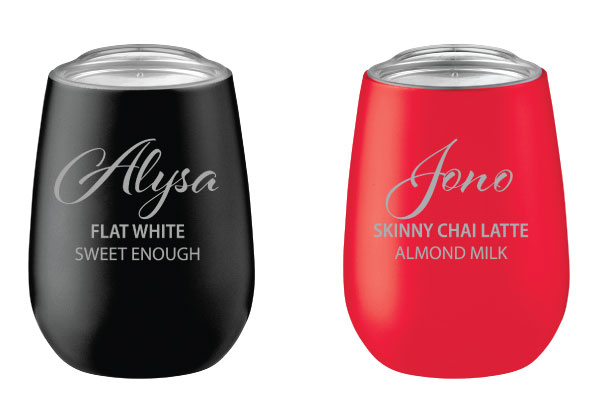Sometimes actions say more than words ever could. The simple fact is we prefer to do business with people we like and showing appreciation is an integral part of any relationship.
Not only that but employees who feel appreciated tend to work harder and stay with the organisation longer. More often than not the “carrot” approach does much better than the “stick”.
Corporate gifts are an effective way to communicate your brands’ values and create enduring connections with clients and staff. But what are they and why are they important?
- What are corporate gifts?
- Why corporate gifts are important?
- What makes a good corporate gift?
- When is the right time to give a corporate gift?
What are corporate gifts?
Corporate gifts are items given for free with the intent of celebrating an event/milestone or as a token of appreciation from a business or organisation. These gifts will commonly be customised to include the brands logo or the recipient’s name. And can also include non-tangible items such as experiences or gift cards.

Why are corporate gifts important?
Now that we’ve established what a corporate gift is, why should you use them? There are many benefits to including corporate gifts into your marketing or HR strategy:
For Employees
- Assists in the onboarding process
- Recognise performance or milestones (10-year service, 25-year service etc.)
- Increase employee satisfaction
- Increased productivity (perhaps better than cash)
- Reduce employee turnover
- Can be used to communicate brand values and story
- Improves office morale
For Customers/Clients
- Develop relationships
- Solidify your brand as the market leader
- Improve brand visibility (keeps you top of mind)
- Increase the chance of referrals and positive reviews
- Increase sales/revenue
For Prospects
- Increase likelihood for conversion
- Generates leads
- Improve brand favourability

What makes a good corporate gift?
There are a number of factors that go into what makes a “good” corporate gift:
Appropriate for the occasion
It’s important that the gift matches the relationship or occasion. For example, it’s probably not a good look to be giving an employee celebrating a 10-year service milestone or your best client a cheap plastic pen. Consider how important this event is and how valuable your relationship is.
Easy to recall who the gift was from
Often around a popular gifting period such as Christmas, it can be easy for recipients to become overwhelmed and overlook what gifts were from who.
You’re investing money into these gifts so you want to be confident the recipient knows they’re from you! Here are some easy tips that you should consider:
- Give your gift with a personalised card with a personalised message
- Add logo decoration or personal messaging to your gift – commonly this will be a custom print or laser engraving depending upon the product
Personalised to the recipient (as much as possible)
The best gifts are not always those with the biggest price tags, but those that have had thought put into them. Put yourself into the recipient’s shoes, is this something that they will appreciate?
Sometimes it is not possible to get each recipient their own personal gift – but having a few different options and selecting the best fit is generally a good strategy.
For example, a sky diving experience might not be the right gift for someone that is afraid of heights or a bottle of wine for someone that doesn’t drink alcohol.
Bonus points if you can individualise the gift with the recipient’s name.

Presentation of the gift
Unboxing a gift is not just about what’s inside, it’s the experience in itself.
It’s also a big reason why any premium item you purchase will likely have spent alot of time taking this into consideration. Did you know there are entire youtube channels dedicated to unboxing things?
The right price tag
You don’t want to spend so little that you come across as cheap and at the same time you don’t want to be spending so much that it’s not a wise business decision.
Finding the right balance between the two is critical to a good corporate gift. Consider what the recipient might expect for the occasion.
Compliments your brands story/values
It’s important to look at corporate gifts as an ambassador to your brand. Does the gift positively reflect your brand and match your values?
For example, if a keep value your organisation has is being environmentally conscious you may want to opt for a gift that compliments this.
When is the right time to send a corporate gift?
Sometimes just choosing the right gift isn’t enough, you also need to know when to give them. Here are some examples:
- Gifting seasons such as Christmas, End Of Financial year or Easter.
- International holidays/celebrations – Chinese new years etc.
- Service milestones (5 years, 10 years, 25 years etc.)
- Achieving employee performance goals
- Award ceremonies
- Event marketing
- International gift giving etiquette (for example gift-giving is an important part of the business protocol in Japan)

Summing Up
It’s time to change the way you think about corporate gifting. Not as an expense, but as an investment. There are a number of benefits for corporate gifting for employees, customers and prospects.
They are a valuable tool in developing critical relationships and just another way you can differentiate yourself from the competition.
At Promotion Products we specialise in Promotional Products and Corporate Gifting. If this is something your organisation might be interested in contact us for suggestions and assistance or browse our promotional gifting range. We look forward to helping you further.
Matt has spent over eight years in Australia’s promotional products industry. As part of the Promotion Products marketing team, he manages product catalogues and content, keeping brands up to date with what’s new and what works. A contributor to the APPA Magazine, Matt brings practical insight into how quality merch helps businesses stand out.


